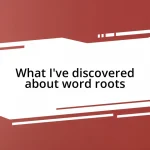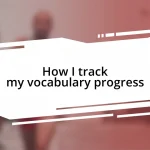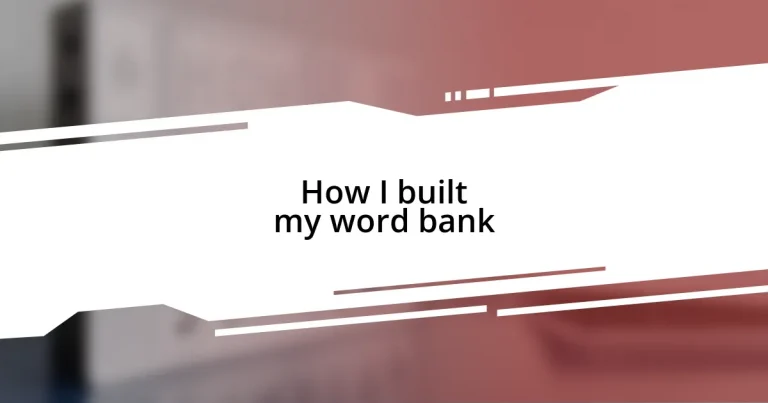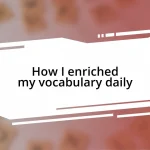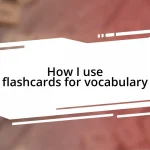Key takeaways:
- Identifying vocabulary needs involves assessing daily interactions and considering the audience to enhance communication.
- Utilizing effective resources like mobile apps, thesauruses, and community groups can significantly aid in expanding vocabulary.
- Incorporating new words into daily use through strategies like maintaining a vocabulary journal and engaging in conversations strengthens language skills.
- Tracking progress and sharing experiences with others makes the learning process more interactive and enjoyable.
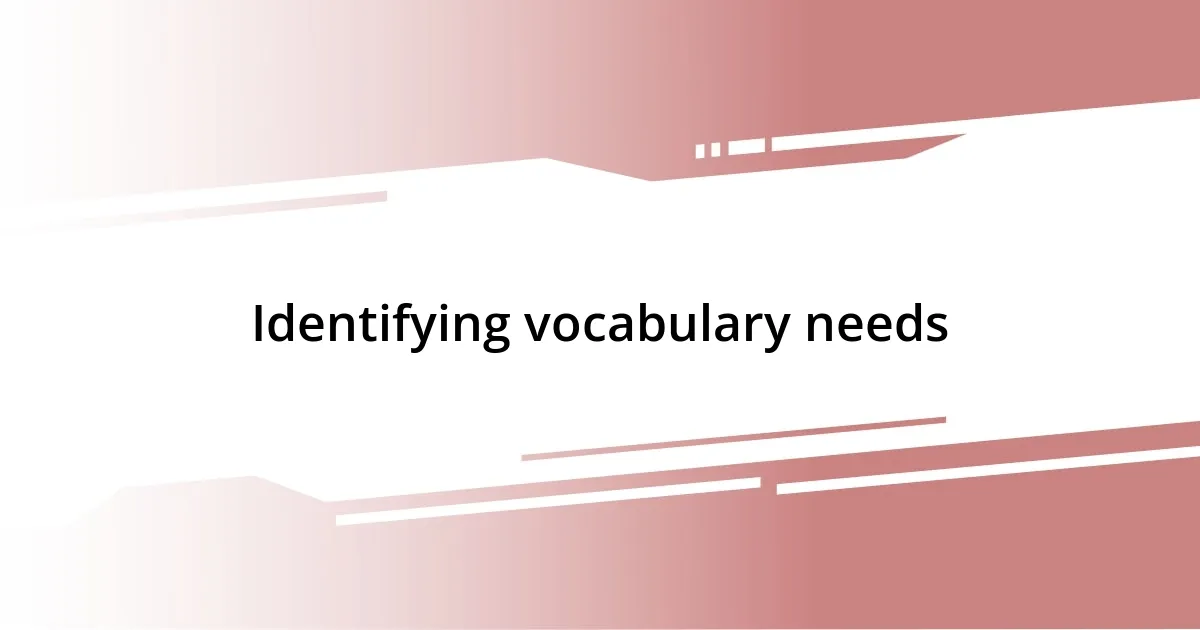
Identifying vocabulary needs
Identifying vocabulary needs starts with reflecting on the context in which you wish to communicate. When I first began expanding my own word bank, I realized that certain situations consistently left me fumbling for the right terms. Have you ever been in a conversation where you felt your vocabulary just wasn’t up to par? I remember those moments vividly—they were both frustrating and motivating.
I found it helpful to assess my daily interactions and the content I was consuming. For instance, after a few weeks of reading academic articles, I noticed a gap in my understanding of specific jargon. Setting personal goals to learn and apply new words relevant to these contexts made a significant difference. It wasn’t just about memorizing; it was about integrating vocabulary into my everyday language.
Moreover, considering the audience is crucial. What works in casual conversations might not fit in a professional setting. I once delivered a presentation where technical terms flowed easily, and afterward, several colleagues mentioned my clear communication. It reinforced my belief that tailoring my vocabulary to meet the needs of the audience not only enhances understanding but also fosters connection. So, what’s stopping you from honing your vocabulary to suit your needs?
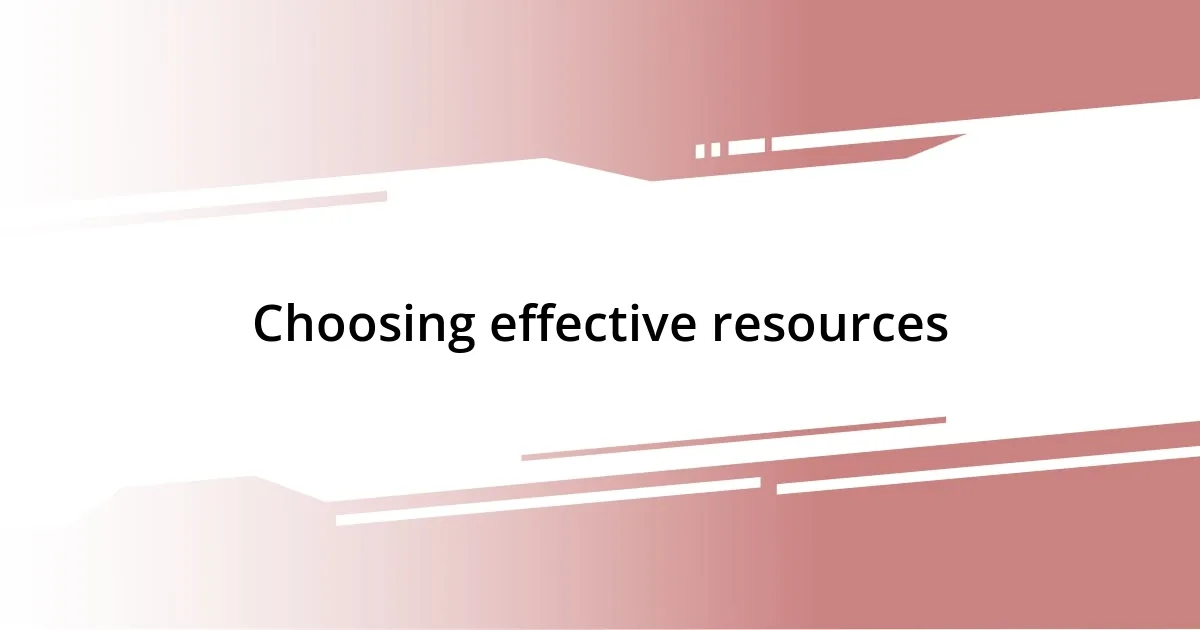
Choosing effective resources
Choosing the right resources for building your word bank is essential. I started by exploring various books and online platforms that offered vocabulary exercises. One resource that truly stood out to me was a mobile app designed for daily word challenges. It made learning feel like a game, which brought a sense of excitement. Have you ever noticed how playful learning helps you retain information better? I certainly did.
Another invaluable resource was a thesaurus. This tool not only introduced me to synonyms but also encouraged me to explore nuances like connotation—the feelings associated with words. While working on a writing project, I came across the word “happy.” Thanks to my thesaurus, I discovered alternatives like “ecstatic” and “content,” which allowed me to choose the best fit for my message. This experience opened my eyes to how word choice impacts perception, and it’s something I continuously reflect on.
Lastly, joining a community—whether it’s an online forum or a local book club—can be transformative. Engaging with others who share your goal of expanding vocabulary creates a support system. I remember sharing insights about newly learned words with friends, and it made our discussions richer. The camaraderie we built around our shared mission kept me motivated. Have you thought about who you might involve in your journey?
| Resource Type | Benefits |
|---|---|
| Mobile Apps | Game-like learning, daily exercises |
| Thesaurus | Explores synonyms, enhances writing |
| Community Groups | Support and shared learning |
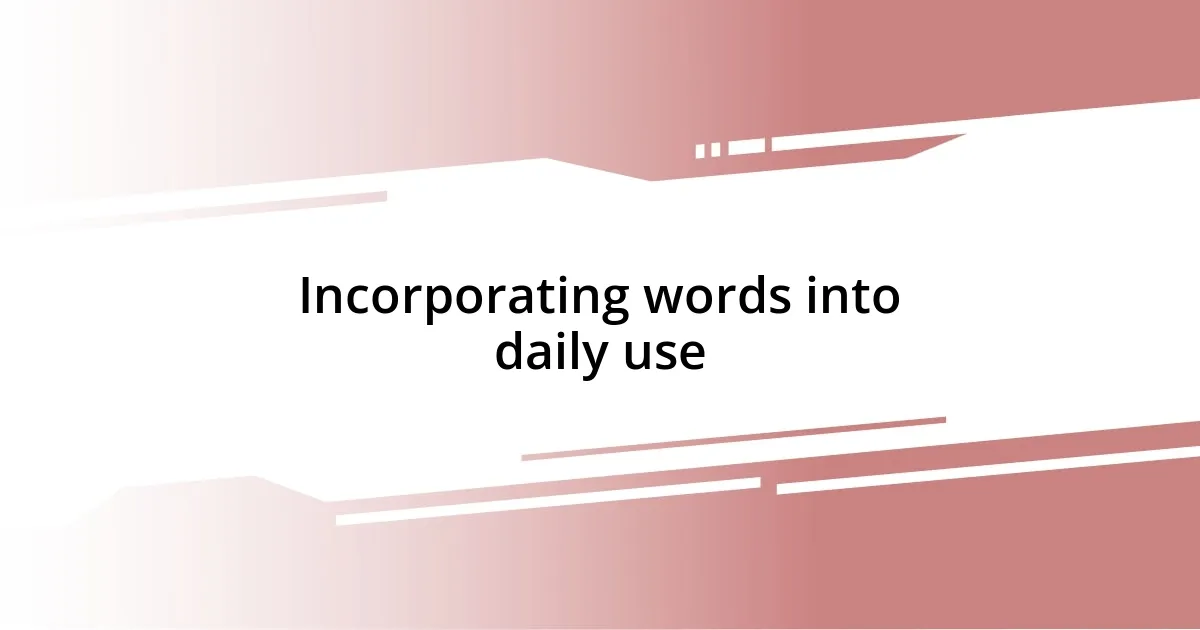
Incorporating words into daily use
As I ventured into expanding my vocabulary, I found that incorporating new words into daily use was a gradual yet rewarding process. Initially, it felt daunting, but I reminded myself that practice makes progress. I started small by using a word of the day in casual conversations, which often led to some light-hearted exchanges. One time, I confidently dropped the word “serendipity” during a coffee break, and my colleagues chuckled, intrigued. It sparked a discussion about our most unexpected joys, and in that moment, I realized how vocabulary can bridge connections.
To make this easier, I developed a few strategies. Here’s a list of methods that worked for me:
- Create a Vocabulary Journal: Jot down new words and examples from your day.
- Daily Conversations: Make a point to sprinkle new vocabulary into your chats.
- Reflect on Reading: Pause after reading to identify words that resonate; use them aloud.
- Label Objects: Use sticky notes with new words around your home or workspace.
- Engage in Writing: Incorporate varied vocabulary into journals, emails, or social media.
I find that these little practices not only enhance my language skills but also boost my confidence in expressing thoughts uniquely. It’s like opening a door to a world where my words truly reflect my personality. I genuinely encourage you to find moments in your day to let new words shine.
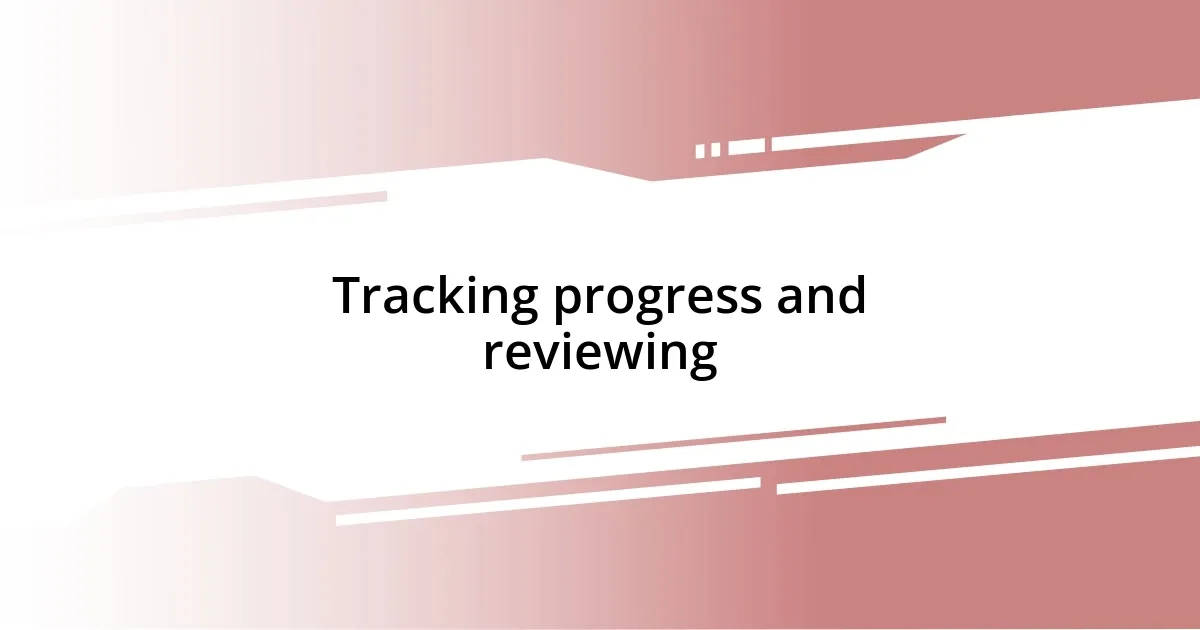
Tracking progress and reviewing
Tracking my progress in building a word bank was a game-changer. I created a simple spreadsheet where I logged new words, their meanings, and examples of how I used them. Each week, I reviewed this list, and it felt like checking off accomplishments on a personal journey, which was incredibly motivating. Have you ever felt that thrill of seeing your growth documented? I certainly did.
Reflecting on my vocabulary challenges was equally important. I set aside time each month to revisit the words that initially stumped me. One particular word, “melancholy,” had slipped through my fingers, but upon revisiting it, I realized I could connect it to moments in my life. Remembering that rainy afternoon spent reminiscing with a friend made the word resonate deeply. How often do we overlook words that carry personal significance? Embracing this connection transformed my approach to vocabulary.
Lastly, I found that sharing my progress with friends added an element of accountability. We would exchange our favorite new words over dinner or during study sessions. One evening, while discussing my latest word, “discombobulated,” my friend shared her hilarious story of being lost in a new city—a perfect example! These interactive conversations reinforced my learning and sparked joy. Isn’t it fascinating how language becomes even more vibrant when shared?
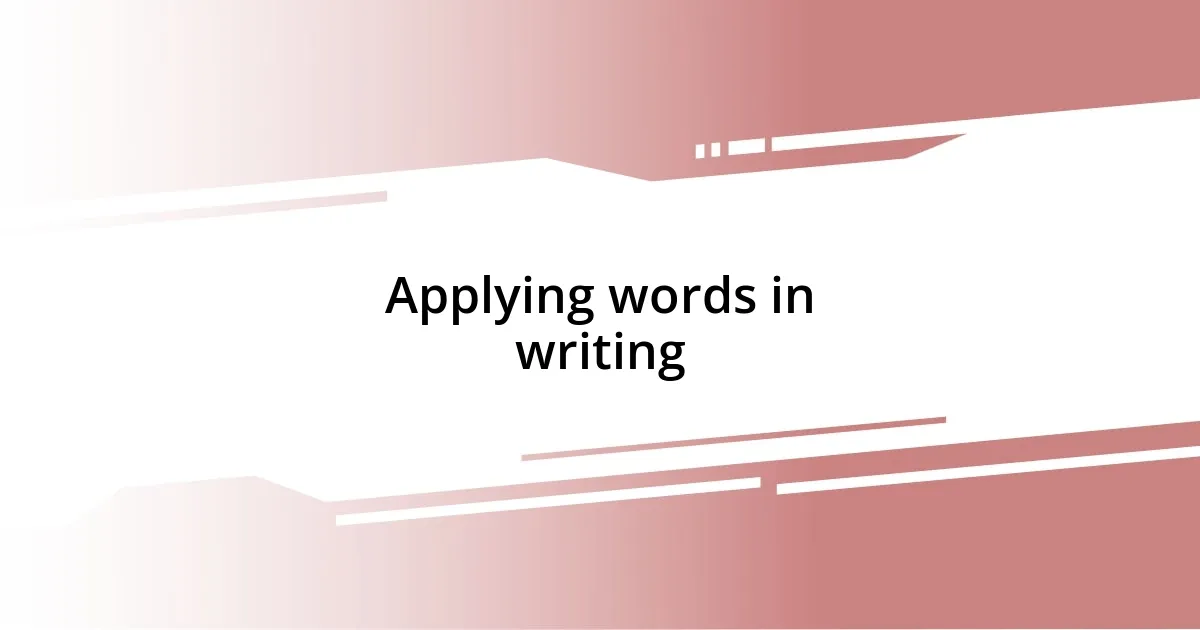
Applying words in writing
Applying new words in writing is where the real magic happens. I remember writing a short story and deliberately using the word “ethereal” to describe a character’s presence. It made the scene feel vivid and alive, and I noticed how the feedback from friends reflected their deeper connection to that moment. Isn’t it incredible how the right word can transform an ordinary sentence into something extraordinary?
During my journey, I’ve learned that context is everything. Each word carries a weight and tone that can shift the entire meaning of a piece. I once submitted a poem where I used “ephemeral” to describe fleeting moments of joy. The word choice not only encapsulated the transient nature of happiness but also made readers pause and reflect. How often do we consider the emotional resonance of words when we write? For me, it’s become a key part of the creative process.
I also find that experimenting with synonyms adds richness to my writing. For example, instead of defaulting to “happy,” I might use “elated” or “jubilant,” depending on the context. This way, my writing becomes more dynamic and expressive. One evening, while drafting an email to my team, I chose “collaborate” over “work together,” and it transformed my message from mundane to inspiring. Words have power; how do you wield yours?
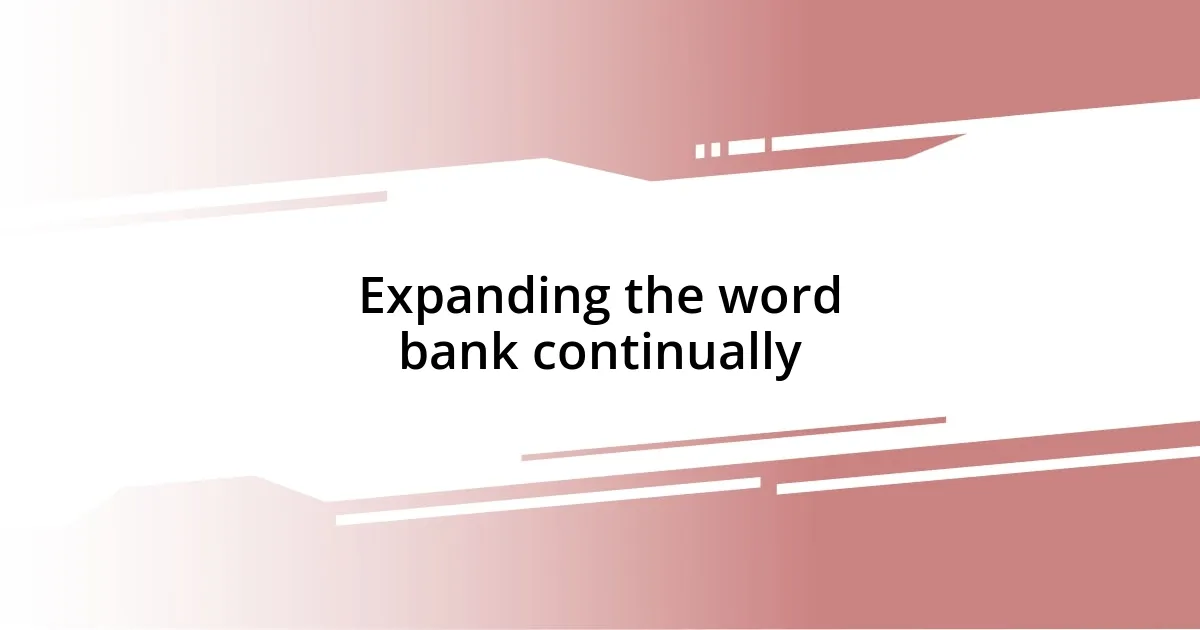
Expanding the word bank continually
Expanding my word bank continually has become an exciting part of my daily routine. I’ve adopted the habit of noting down intriguing words I encounter while reading—whether it’s in a novel, an article, or even a recipe! Just the other day, I stumbled upon “serendipity,” and it struck me how it perfectly embodies those delightful surprises life offers. How often do we overlook words just waiting to bring joy to our conversations?
I also immerse myself in diverse media, keenly absorbing different contexts where particular words flourish. For instance, I once overheard someone use “cacophony” to describe the noise of a bustling café, and it resonated with me. It was a vivid reminder of how sound can influence our emotions and help paint a scene. Have you ever thought about how a single word can encapsulate an entire experience or atmosphere?
Moreover, I make it a point to challenge myself with new words each week. Joining a word-a-day group online has fueled my passion. A few weeks back, the word “quintessential” came up, and it pushed me to think about what makes a moment or an experience truly essential. I ended up crafting a heartfelt piece about my favorite childhood memory, weaving that word seamlessly into my narrative. It’s incredible how intentional practice shapes not just our vocabulary but also our ability to express ourselves!

